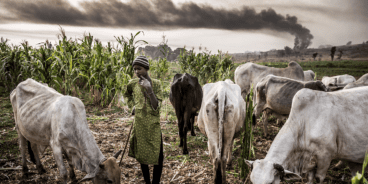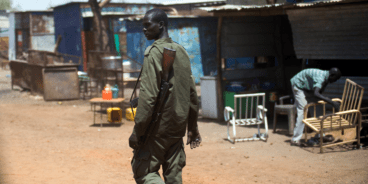
Atrocity Alert No. 104: Nigeria, Burundi and South Sudan
Atrocity Alert is a weekly publication by the Global Centre for the Responsibility to Protect highlighting situations where populations are at risk of, or are enduring, mass atrocity crimes.
Nigeria battles to restore security in the northeast
Despite losing all the territory it once held in northeastern Nigeria, in recent weeks the extremist armed group Boko Haram has carried out a new campaign of attacks in Borno and Adamawa States. An attack on villages outside Maiduguri during April killed 18 people. On 1 May Boko Haram carried out a suicide bombing of a mosque and market in the town of Mubi which killed at least 27 people. The Nigerian Army also recently claimed that it had freed more than 1,000 captives from Boko Haram after a major week-long battle with the group.
Although the Nigerian government officially declared victory over Boko Haram more than two years ago, ongoing insecurity in the north of the country leaves civilians at continued risk of violence. Over the past nine years Boko Haram has consistently targeted schools, places of worship and vulnerable populations, killing at least 6,000 civilians.
Violence between traditional herders and local farming communities has also intensified in central and northern Nigeria, with hundreds of people reportedly killed during April. At least 51 people, including children, were also killed on 5 May when armed bandits attacked a village in Kaduna State. According to the police, the attack was in retaliation for the killing of bandits by a local vigilante group two weeks earlier.
The United Nations High Commissioner for Refugees has claimed that despite ongoing insecurity, between January and April 2018 at least 385 Nigerian refugees and asylum-seekers who had fled Boko Haram violence were forcibly returned to Nigeria from Cameroon. There are still an estimated 110,000 Nigerian refugees in northern Cameroon.
While continuing to confront Boko Haram, the Nigerian government must intensify programs that strengthen local security for vulnerable communities and bolster the rule of law. Refugees must be repatriated on a strictly voluntary basis, in keeping with the principle of non-refoulement. It is important that land reform, refugee resettlement and community security form part of an integrated strategy aimed at countering violent extremism and addressing the undying sources of conflict in Nigerian society.
Burundi bans foreign media as hate speech increases
Last Friday, 4 May, the government of Burundi suspended the operations of several international media organizations, including the British Broadcasting Corporation (BBC) and Voice of America, for six months. The decision comes less than two weeks before Burundians vote in a 17 May referendum on President Pierre Nkurunziza’s proposed draft changes to the constitution. The amendments would allow Nkurunziza to potentially run for office for another two seven-year terms, as well as provide an opportunity to abolish ethnic quotas within the government.
As the date of the referendum approaches, perceived opponents of President Nkurunziza have been intimidated, beaten, arrested and killed by the security forces and supporters of the ruling party, Conseil National Pour la Défense de la Démocratie-Forces pour la Défense de la Démocratie (CNDD-FDD).
There has also been an alarming increase in hate speech by some government officials and ruling party members. Cyprien Sinzotuma, provincial secretary of the CNDD-FDD in Muyinga province, recently gave a speech in which he called on supporters to “castrate the enemy.” Sinzotuma was speaking in front of members of the Imbonerakure, the CNDD-FDD’s youth wing, who have previously been implicated in violent intimidation, enforced disappearances of opposition activists and extra-judicial killings.
As the date of the referendum vote approaches it is imperative that practical steps be taken by the government to de-escalate tensions and punish incitement to violence. The UN Human Rights Council-mandated Commission of Inquiry on Burundi should also be allowed access to the country in order to investigate alleged systematic violations of human rights. The UN Security Council and African Union should impose targeted sanctions against all those who continue to threaten peace and security in Burundi, including suspected perpetrators of crimes against humanity listed by the Commission of Inquiry.
Once again, South Sudan’s leaders choose war over peace talks
On Thursday 19 April renewed fighting broke out between government troops and armed opposition groups in Unity, Jonglei and the Central Equatoria States in South Sudan. On 27 April the UN Peacekeeping Mission in South Sudan (UNMISS) reported an intensification of fighting as well as incidents of sexual violence, the burning of homes and the looting of hospitals and schools. Hundreds of displaced civilians sought protection at UNMISS bases at Leer and elsewhere, and thousands more have fled into swamp and bush areas without access to food, clean water and medical care.
Following a visit to Leer and Dublual in Unity State, the UN Secretary-General’s Special Representative for South Sudan, David Shearer, said on 2 May that the violence “looks set to continue despite the Cessation of Hostilities Agreement that was signed last year.”
The third round of the High-Level Revitalization Forum (HLRF) – an attempt to reinvigorate the 2015 Peace Agreement – has been postponed until 17 May. In a statement the regional organization, the Intergovernmental Authority on Development (IGAD), stressed that “there still exist wide gaps between the different groups that need to be narrowed” before the HLRF will be able to reconvene. IGAD has invited key representatives to “pre-consultations,” to be held between 10 and 12 May.
As the seventh anniversary of South Sudan’s independence approaches, the country is no closer to overcoming its deadly divisions. It has been five months since the UN Security Council issued a Presidential Statement in support of the HLRF, warning that there would be a “cost and consequence for those who violate the agreement.” During January the Chair of the AU Commission also said that “the time has come” for sanctions against those who obstruct peace in South Sudan. The international community must finally take decisive action – including imposing an arms embargo – to support the HLRF and help end the armed conflict in South Sudan once and for all.
Related Publications


Atrocity Alert No. 443: Sudan, Israel and the Occupied Palestinian Territory and United States Travel Ban
